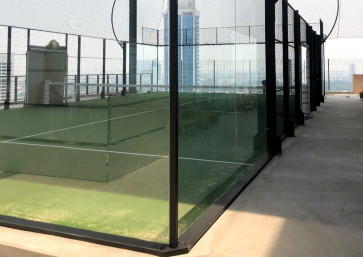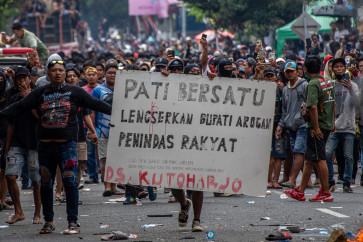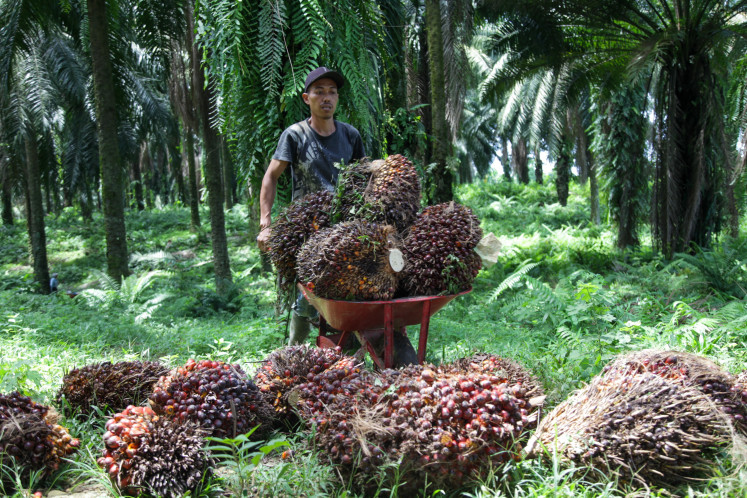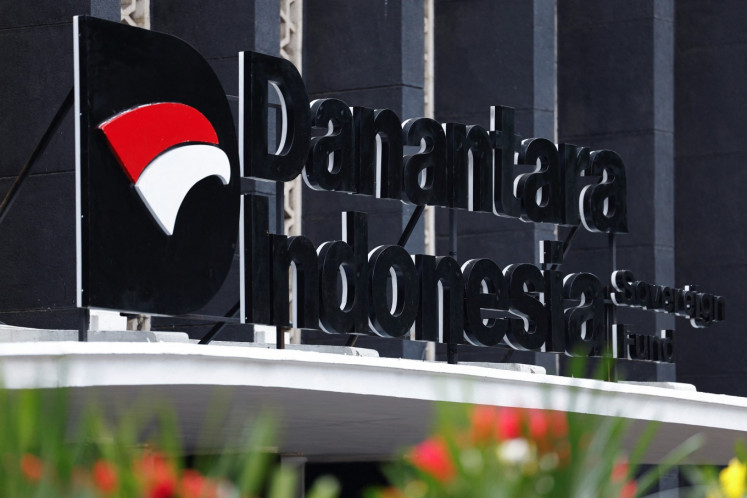Popular Reads
Top Results
Can't find what you're looking for?
View all search resultsPopular Reads
Top Results
Can't find what you're looking for?
View all search resultsNew policies to end logistics nightmare
The cost of logistics inefficiency is staggering: About 40 percent of what the public pays for goods goes to cover logistics costs and 72 percent of that is spent on transportation
Change text size
Gift Premium Articles
to Anyone
T
he cost of logistics inefficiency is staggering: About 40 percent of what the public pays for goods goes to cover logistics costs and 72 percent of that is spent on transportation. That is what the Office of the Coordinating Economic Minister says.
Having become fully aware of the scope of the problem for the economy, the government has finally moved to resolve the issues through another economic package, its 15th in the past year, detailing what it intends to do and the targets it would like to achieve.
Ushering in the reform of logistics management, the package basically consists of attempts to strengthen the Indonesia National Single Window (INSW) licensing system and to improve the competitiveness of domestic logistics companies.
Other policies include providing more business opportunities to shipping firms, marine insurance providers and shipyards and setting up a powerful task force to manage and coordinate the flow of regulated goods.
The government calls the INSW, which operates under the Finance Ministry, a game-changing policy as the system will immediately replace the authority of 17 ministries and institutions involved in port management and create a single system and risk management scheme.
Launched in 2007 to anticipate the establishment of a similar facility in ASEAN, the INSW manages the country’s flow of goods through an integrated electronic system. This results in an efficient shipping mechanism, a significant reduction in goods clearance time and, in the end, lower business costs.
However, up until now a lack of coordination among ministries and institutions, which already have their own systems to administer export and import licenses, has been seen as an obstacle to maximizing the function of the system.
The facility aims to integrate export and import licensing, which will eventually reduce dwell time at the country’s ports. The incorporation of these units under the INSW is also expected to eradicate red tape, another issue hampering the ease of doing business.
“Strengthening the function of the INSW will be our utmost priority,” Coordinating Economic Minister Darmin Nasution said on Thursday.
“Several presidential regulations will be amended to pave the way for the reform of port management.”
Port inefficiencies have caused Indonesia to lag behind its neighboring countries in terms of logistics performance, eroding the competitiveness of domestic businesses that trade internationally.
The ratio of Indonesia’s logistics costs to its gross domestic product (GDP), which stands at 26 percent, is more than twofold Singapore’s and Malaysia’s.
“Anything that the government can do in this area would be welcomed and would improve the welfare of Indonesia,” Rodrigo Chaves, the World Bank’s country director for Indonesia, said.
“Reduction in logistics costs will boost growth. The question is about implementation.”
To improve the competitiveness of logistics companies, the government is slated to scrap a minimum capital requirement for sea transportation companies, shipping agencies, port management firms, loading and unloading service firms and freight forwarding firms.
“The lifting of the minimum capital requirement for port management businesses is to encourage the privatization of ports. We currently have 20 ports for sale and will add 10 more,” Transportation Minister Budi Karya Sumadi said.
“For freight forwarding businesses, we are also revoking the limitation on foreign ownership in joint ventures,” Budi added.
The government also plans to scrap the import duties on 155 types of spare parts for vessels to support shipyards and ship maintenance businesses.
“Despite having seen improvement in the ease of doing business, we still need to reform the logistics system,” Cabinet Secretary Pramono Anung said.
“This economic package will at least resolve some parts of it.”
Among the issues slowing down activities in ports is the import and export of regulated goods (lartas).
Such goods include rice, meat and vegetables, to name a few.
Darmin explained that 49 percent of goods shipped in and out of Indonesia were categorized as lartas, far more than the average 17 percent in other ASEAN countries.
“The complexity of managing this has caused unnecessary bottlenecks in ports,” said Darmin, adding that the task force to deal with the issue would improve coordination between ministries and agencies for the management of the regulated goods.
Darmin believes that the recent policy package will help create new business opportunities worth US$600 million for domestic logistics companies.
There would also be a demand for as many as 100 new ships worth US$700 million that would require at least 2,000 new merchant mariners to be recruited, Darmin says.










